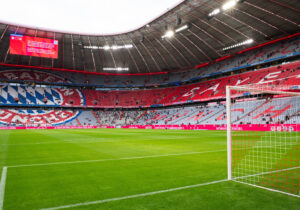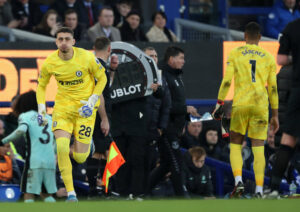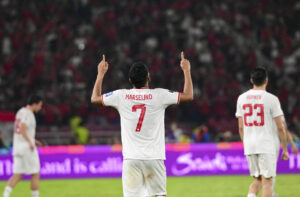After a summer of fan parks, beer showers and scenes of celebration never seen before, it all came to an end last night when England fell at the semi-final hurdle of the 2018 World Cup. It had all been going so well for Gareth Southgate’s side; they led early on through Kieran Tripper’s stunning free-kick and had numerous chances to kill off the game before half-time. Croatia’s resilience brought them back though, and an Ivan Perisic strike coupled with Mario Mandzukic’s extra-time volley sent the Croats to their first-ever final.
This is Just the Beginning for This England Team
Unlike tournament exits in the recent past, though, there is a huge sense of optimism and pride surrounding the England team at the moment. Nobody wanted a repeat of the humiliation of Euro 2016, and they were treated to the exact opposite with this tournament, for this is an England team not looking back on past glories, but one that is looking firmly in the right direction as a unit and as a group. They had one goal this summer, and that was to make fans believe, once again, that an England team could be successful. It was achieved.
From the very first game against Tunisia, we could see there was something different about this side. They played with confidence and maturity beyond their years and were led by a man that had drilled that into them from his first day in charge. There were still nervy moments; perhaps the one that stands out the most was Tunisia’s leveller in the opening game, coming from a Kyle Walker mistake. If England hadn’t won that game, there is a very little chance they would have come as close to the final as they did. However, the nervy moments were kept to a minimum in comparison to previous tournaments. Think about how many chances Germany had to finish them off in that 2010 Round of 16 game, or how many opportunities they gave Iceland two years ago in France. England were, for once, calm, and that comes from their manager.
‘Southgate You’re the One…’
The first thing to remember about Gareth Southgate’s tenure as England manager is that he didn’t initially want the job. He was considered for the role after Roy Hodgson’s departure, but it was not what he wanted at that stage. The job instead went to Sam Allardyce, who famously lasted just one game before being sacked by the FA.
However, after taking interim charge following this sacking, Southgate was confirmed as the new permanent manager in November 2016 on a four-year-deal. The announcement was greeted with very mixed reviews. Some pointed to his position in the England set-up, citing his experience at with the youth teams, while others pointed to his lack of success as a club manager with Middlesbrough, taking them down to the Championship and being sacked in 2009 from his only club managerial role.
The man himself admitted that he didn’t feel comfortable about the way he had taken the reigns with England, and said that this World Cup was “a journey I didn’t expect or want to be on”.
What people started to realise from the start of this tournament, even from the squad announcement, though, was that Southgate was different to any other manager England have had. He didn’t pick players on past glories when he easily could have done; instead, he introduced an influx of young talent. Players like Ruben Loftus-Cheek and Joe Gomez played in the penultimate bout of friendlies before the selection, while Trent Alexander-Arnold was selected for the tournament before making his senior England debut. He picked a team that England fans, especially young ones, could relate to, whilst still having enough tournament experience there to make sure England didn’t choke under the pressure.
Southgate’s formation also allows this England team to flourish, and it would be a shame to see it dropped after the World Cup. His version of a 3-5-2 provides enough cover at the back, gives the right level of midfield presence and does not leave the attack isolated. There could be adaptations made to it, as England’s width was questioned at times throughout the World Cup, but this was a learning curve for him as well as the team.
A Fighting Spirit
Southgate’s squad decision paid massive dividends. Very few of the players had tournament experience and a couple were even making their competitive debuts.
The back three of Kyle Walker, John Stones and, in particular, Harry Maguire, had a solid tournament and were heaped with praise after every game. Maguire was commended for his sheer physicality, both in defence and attack, as well as his ability to bring the ball into midfield and help England spring attacks. While Stones stayed further back than his teammate, he was a constant threat from set-pieces, scoring from them twice in the 6-1 win over Panama and having a wonderful header cleared off the line against Croatia.
Maguire didn’t make his debut until the final qualification game, a 1-0 win in Lithuania. Stones has had some tournament experience for England; he was selected for Euro 2016 but was exempt from criticism after not playing at all in France. He was also on the standby list for the previous World Cup but was not selected.
Goalkeepers Jordan Pickford and Nick Pope were others coming into the England fold for the first time. While Pope did not play at all in Russia, to be selected was a massive honour for the Burnley goalkeeper, who only came into the Clarets’ side after a lengthy injury to Tom Heaton. Pope’s performances helped Burnley to a remarkable 7th place finish in the Premier League and convinced Southgate he should be on the plane. Pickford, meanwhile, only made his debut last November, and has only recently come into the domestic spotlight.
He was the saving grace in a woeful Sunderland team before he broke the British transfer record for a goalkeeper with his move to Everton at the start of last season. His performances at this World Cup have quite rightly been heaped with praise. He made two unbelievable saves against Colombia, kept England’s lead against Sweden and saved wonderfully from Mandzukic last night. He will surely be England’s number one for years to come after this tournament.
The Future Looks Bright
Since the heartbreak of 2016, the future has looked increasingly bright for England, particularly at youth level. They were the victors of the U17 and U20 World Cups, the U19’s won the European Championships, and the U21’s were the semi-finalists at their Euros, as well as being successful at two successive Toulon Tournaments.
It was down to the senior team to add to that list, and they duly have.
Of the 23-man squad picked for this World Cup, 13 will still be under the age of 28 for Euro 2020, including all three goalkeepers, star performers Stones and Maguire and new boys Loftus-Cheek and Alexander-Arnold.
This World Cup may be the end for some players, though. Ashley Young turned 33 during the tournament and was the oldest player in the squad coming into it. Jamie Vardy may make it for the next Euros depending on his Leicester performances for the next two years, but another World Cup is surely out of reach. Gary Cahill could struggle for either tournament unless he fights his way back in at Chelsea.
However, those departing players are going to be replaced by younger, more experienced members of this squad. Kieran Trippier, Harry Kane and Jesse Lingard will be 31, 28 and 29 respectively for the next World Cup and will be expected to lead the group; a significantly younger leading group than Young, Vardy and Cahill.
The amount of quality youth players coming through is hard to believe. Ryan Sessegnon, the Fulham teen sensation, was tipped by many to make the squad for this World Cup. Southgate felt it was too soon for him, but invited him, Manchester City’s Phil Foden and Chelsea’s Mason Mount along to Russia to get the feel of an international tournament. The trio also trained at St George’s Park with the squad before they left, along with new Southampton signing Angus Gunn and another Chelsea youth, Trevoh Chalobah.
It Sort Of Came Home
You couldn’t have gone anywhere in England over the last few weeks and not heard ‘Three Lions’ playing on a radio or over a tannoy. The line ‘It’s Coming Home’ became an internet sensation in itself, referring to people’s support of England winning the trophy.
While football, in that sense, didn’t ‘come home’, it did in another. England, finally, played football properly; with spirit, determination and passion. After so many years of hurt, this England team finally made us believe again. They made us fall in love with football again. They joined a nation that has been so divided. For that, we thank them.
Gareth Southgate and this England side may not have won the World Cup, but they fared so much better than anyone could have dreamed. They will come back as heroes.
Main Photo






